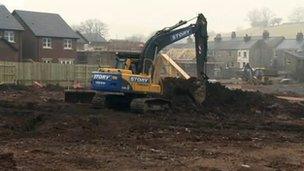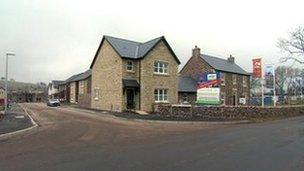Will a planning referendum in Cumbria catch on elsewhere?
- Published

Voters will decide on plans for housing and infrastructure
The 4,000 residents eligible to vote in the first local planning referendum live in the most sparsely populated area of England.
Voters in Cumbria's Eden Valley will be polled on a plan for housing and development drawn up by one of the new neighbourhood planning groups.
The issues involved in the poll are very specific, and very local, but what's happening in the Eden Valley area is being closely watched.
Under the government's Localism Act, communities are encouraged to get more involved in planning decisions and help shape local policy.
The plans they prepare will have legal force if passed by a simple majority in a referendum.
These neighbourhood plans must adhere to national planning laws, and meet the strategic objectives set by the local authority.
They cannot be used to block development outright, but they can give residents a say about where houses are built and what they might look like.
The government says there are about 20 other neighbourhood planning referendums in the pipeline.
More than 500 groups are said to have expressed an active interest in neighbourhood planning.
Places like the Eden Valley have a track record of community engagement - it was in the vanguard of David Cameron's Big Society idea.
Consequently, local people are used to forming themselves into committees to influence local issues.
But will the idea catch on around the country?
Layer of complexity
Most professional planning organisations are broadly in favour of the principle of community engagement.
They say that good local planning policy should have the support and consent of local people.
Some experts, though, wonder whether large numbers of residents will have the commitment and knowledge to complete the arduous process of preparing a neighbourhood plan and putting it to a local referendum.
There may already be faster and easier ways for people to engage with the planning process - perhaps by trying to help shape the local plan dawn up by the council for the whole area covered by the local authority.

The government says similar groups have expressed an interest in neighbourhood planning
Developers had been somewhat nervous about the new neighbourhood groups, initially fearing that they might be used by local residents to stall the construction of new homes.
But the building industry now supports the idea and developers have been given the safeguard that neighbourhood groups will not be able to propose a lower number of new homes overall.
Builders acknowledge the need to have the support of the community for new development.
That is not to say that every referendum will sail through unopposed, some of these local polls may be extremely controversial.
The status of these new neighbourhood plans is likely to be tested, to see what legal weight they have in practice over decisions on where and what to build.
The government says this is the beginning of a process of trying to make the planning system more open and responsive to the needs of local people.
But some may suggest it adds another layer of complexity.
The test will be whether neighbourhood planning results in faster, better decisions for the whole community.
Or whether it gives planning enthusiasts a new way to obstruct, delay and pursue their own narrow self interest.
- Published9 November 2011
- Published14 October 2011